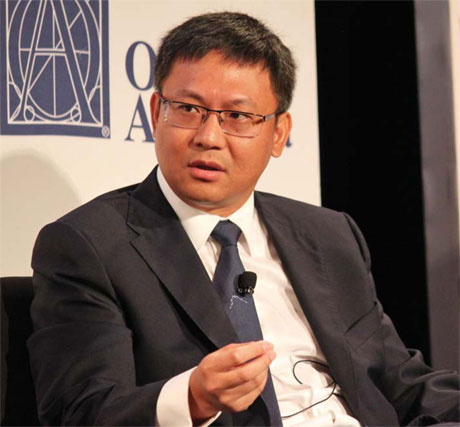ZTE hopes to make more US inroads
Updated: 2011-10-28 09:26
By Zhang Yuwei (China Daily)
|
|||||||||
|
Cheng Lixin says Chinese firms need to follow US rules if they want to compete in the market. [Huo Yongzhe / China Daily] |
Chinese telecom equipment firm hopes to boost revenue with slew of quality, affordable models
Competition is intensifying in the global smart phone market with a slew of Chinese phone-makers getting ready to challenge the dominance of European and American companies with an array of attractive models, smart pricing and newer technologies.
Chinese telecom equipment-maker ZTE Corp, is looking to make sizable inroads in the United States with its affordable technologies for smart phone users, says Cheng Lixin, chief executive for the North American region at ZTE USA.
Shenzhen-based ZTE is China's second-largest telecom equipment supplier after Huawei Technologies Co Ltd and makes mobile phones, data cards and infrastructure for wireless networks.
According to Cheng, the ZTE game plan focuses on the "A-C-W" (America-China-Worldwide) model. The crux of that strategy is to gain more recognition for the company and its products in the US market by relying on the low-cost manufacturing base in China and also to gain more global recognition through the overall production efficiency.
For ZTE, success in the US is vital as it is slated to become its top market in the next five years, says He Shiyou, executive vice-president of ZTE USA.
Part of the overall strategy also involves co-branding ZTE devices with better-known US carriers to familiarize customers with the company, Cheng says. Though the manufacturing process is oriented toward value and lower prices, the company will offer customers handsets that are similar to the high-end phones launched by more familiar brands at lower prices.
Last month, ZTE USA teamed up with Cricket Communications, a subsidiary of Leap Wireless International Inc - the seventh-largest telecom network in the US - to launch the ZTE Score, a full-featured Android smartphone in the US.
Providing high-end technology at affordable prices is ZTE's bestselling point, says Cheng adding that the ZTE Score has been priced at $129.99. "It (ZTE Score) provides the best technology at an accessible price."
But Cheng admits that it has not been an easy road for Chinese telecom companies in the US.
Telecommunications is still categorized as a sensitive industry for foreign investors in the US. Last year, US lawmakers asked the Federal Communications Commission to review the security risks of American companies, such as Sprint Nextel, that use equipment from ZTE and Huawei.
Sprint later reported that it ordered gear from other global suppliers. Representatives from Sprint said the company's decisions on vendors were not influenced by any government intervention.
In January, the US China Economic and Security Review Commission, an independent panel that advises Congress, indicated that Chinese telecommunications companies might be conscripted into plans for interfering with or gaining intelligence from US wireless networks. The US government had earlier expressed concern over Huawei founder Ren Zhengfei's links with the People's Liberation Army, even though he had left the army in 1983.
Responding to these charges, Huawei challenged US authorities to launch an investigation into its business. In earlier instances, the US government foreign investment review had forced Huawei to sell assets purchased from 3Leaf and also blocked the deal with 3Com.
Chinese executives in various business forums have expressed their concerns about the US not being receptive to Chinese investment in the telecommunications industry and the lack of a level playing field vis--vis domestic technology companies.
Cheng, however, chose to refrain from making any comments on Huawei or on US policies. "Chinese companies need to follow local rules if they want to compete in the US market," he says.
"I think we have to work in the local environment. The US has its own laws and rules for business investors and if we want to be successful in this market, we should closely follow them. You can never work around them, you follow them and there is no other way to do it," Cheng says.
"The US market is big, I would rather focus on looking for opportunities here."
Revenue from international operations grew nearly 27 percent in 2010 to $5.7 billion and accounted for 54 percent of the company's overall operating revenue, according to ZTE's full year earnings numbers released in March this year. The US and European markets accounted for a lion's share of the overseas revenue, with year-on-year growth of 50 percent, and a 21 percent share of the total operating revenue.
Clearing the air about the company structure, Cheng says ZTE is a publicly traded with more than 20 percent of its shares held by investors from outside China.
Though the US market share is still "relatively low", Cheng says efforts are underway to grow it significantly. Though ZTE doubled sales in the US last year, it hopes to make more inroads through ventures with carriers such as T-Mobile, AT&T and Sprint.
"It's been a good experience and our growth has doubled every year," Cheng says.
ZTE established its presence in the US nearly 15 years ago. It has 14 offices in the US, and employs more than 400 people, with the fresh hire intake last year being around 180. "Eighty percent of the new hires are local hands and have helped boost foreign investment," Cheng says.
The 45-year-old telecom industry veteran took charge as president and CEO of ZTE USA in June 2010. Prior to that, Cheng had worked with Ericsson in China and San Diego and also had his own business consultancy. Cheng travels 90 percent of the time, shuttling across North America and between China and the US almost every month.
"ZTE actually was one of my clients when I had my own company. I am someone who keeps business contacts and maintains a good relationship with my contacts in more than 57 countries," Cheng says.
But at the same time, he says he has no regrets for having given up his own company to join ZTE.
"I think I am in a unique position to help ZTE grow in the US, having lived here since 2001," Cheng says. At the same time he is also optimistic of more Chinese investment coming into the US.
"From a global economic point of view, China is the world's second largest economy and it holds about 28 percent of the global cash reserves. Over the years, China has accumulated huge wealth and that needs to be invested," he says.
Cheng feels that China and the US are two big players on the world stage. "Historically, when the relationship between the two sides are in good shape, everything else is good."
At the same time, he cautions Chinese companies that they shouldn't take it for granted that they could replicate their China success in the US. Chinese companies should quickly learn to adapt to the local system, he says.
"China's rapidly growing economy, along with a host of other factors, like the World Trade Organization membership, have helped create a strong platform for Chinese investments overseas."












